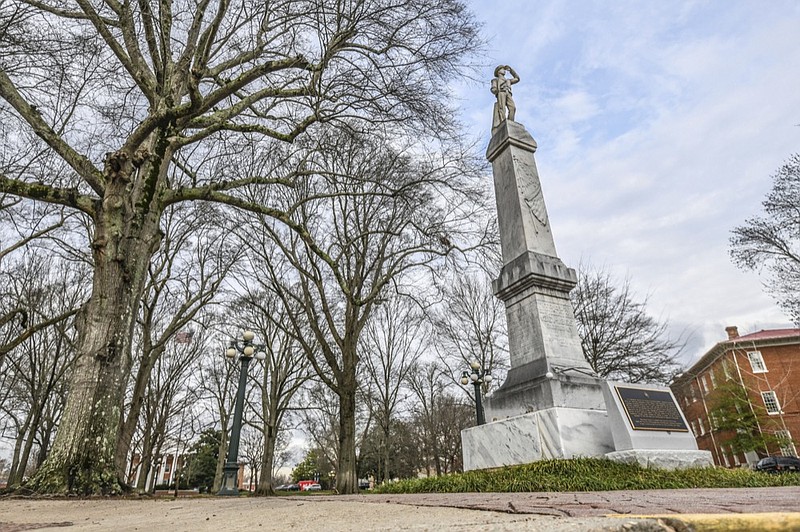JACKSON, Miss. (AP) - A Confederate monument will remain, for now, in a prominent spot on the University of Mississippi campus, nearly a year after student leaders requested that it be moved to a Civil War cemetery.
The board that governs Mississippi's eight public universities met Thursday and delayed a vote on a proposal to move the monument. Trustee Tom Duff said he wants more information from the university about its work to provide historical context about the monument and some other structures on campus.
The Confederate cemetery is on the Oxford campus, but it's in a place few people walk or drive.
The University of Mississippi was founded in 1848, and the marble statue of a saluting Confederate soldier was put up in 1906.
It is one of many Confederate monuments erected across the South more than a century ago. Critics say its display near the university's main administrative building sends a signal that Ole Miss glorifies the Confederacy and glosses over the South's history of slavery.
The statue was a rallying point in 1962 for people who rioted to oppose court-ordered integration of the university.
Pro-Confederate groups from outside the university rallied at the monument Feb. 23, prompting Ole Miss basketball players to kneel during the national anthem, in protest of the rally. Student government leaders voted March 5 to ask administrators to move the monument to the cemetery, where Confederate soldiers killed at the Battle of Shiloh are buried.
In December, trustees of the Mississippi Department of Archives and History approved Ole Miss' architectural and engineering plans for moving the monument. That board said the plans meet U.S. Department of Interior standards for treatment of historical monuments.
Ole Miss Chancellor Glenn Boyce said in a statement Thursday: "We are committed to working with the board to accomplish our goal of relocating the monument. We appreciate all of the work that our campus constituents and others have put forward on this important issue."
Mississippi Higher Education Commissioner Alfred Rankins Jr. said any college board trustee may delay a vote on any agenda item. Rankins said the relocation of the Confederate monument will be considered after the university provides the information Duff requested.
Mississippi can be slow to accept change. After court-ordered integration, some officials said schools would move that direction with all deliberate speed - but the foot-dragging went on for years. Legislators still often kill proposals by ignoring them.
The University of Mississippi has worked for more than 20 years to distance itself from Confederate imagery, often amid resistance from tradition-bound donors and alumni. The nickname for athletic teams remains the Rebels, but the university retired its Colonel Reb mascot in 2003 amid criticism that the bearded old man looked like a plantation owner. In 1997, administrators banned sticks in the football stadium, which largely stopped people from waving Confederate battle flags. The marching band no longer plays "Dixie."
Because of a student-led effort, the university in 2015 stopped flying the Mississippi flag, the last state flag in the U.S. to prominently feature the Confederate battle emblem.
Since 2016, the university has installed plaques to provide historical context about the Confederate monument and about slaves who built some campus buildings before the Civil War. A plaque installed at the base of the Confederate statue says that such monuments were built across the South decades after the Civil War, at a time that aging Confederate veterans were dying.
"These monuments were often used to promote an ideology known as the 'Lost Cause,' which claimed that the Confederacy had been established to defend states' rights and that slavery was not the principal cause of the Civil War," the plaque says. "... Although the monument was created to honor the sacrifice of Confederate soldiers, it must also remind us that the defeat of the Confederacy actually meant freedom for millions of people."
